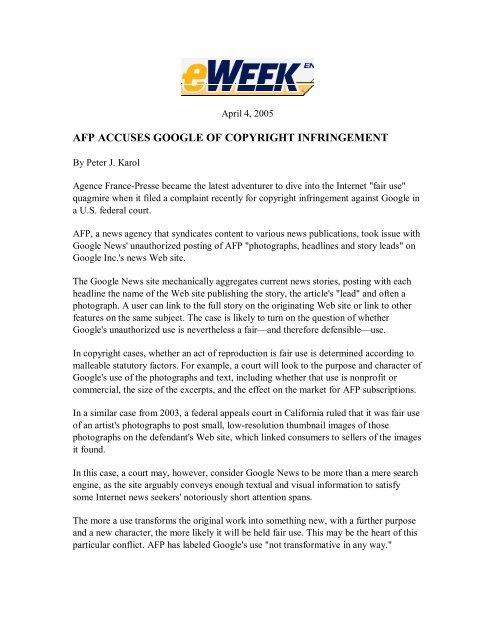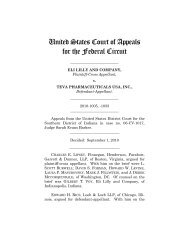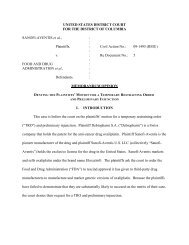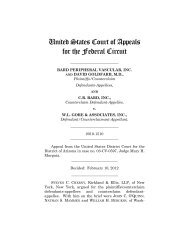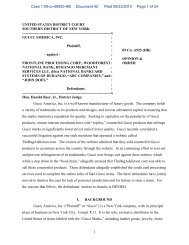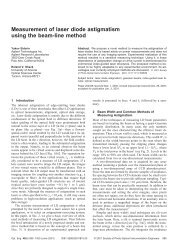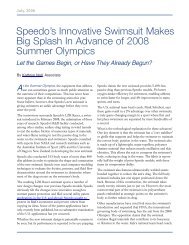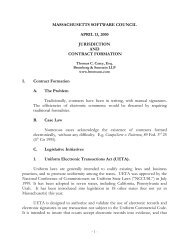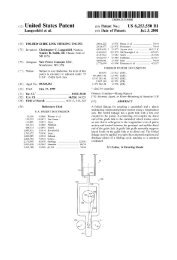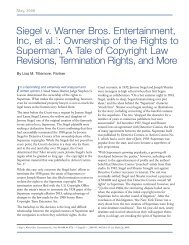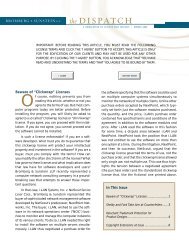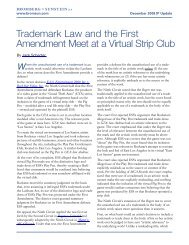AFP ACCUSES GOOGLE OF COPYRIGHT INFRINGEMENT
AFP ACCUSES GOOGLE OF COPYRIGHT INFRINGEMENT
AFP ACCUSES GOOGLE OF COPYRIGHT INFRINGEMENT
You also want an ePaper? Increase the reach of your titles
YUMPU automatically turns print PDFs into web optimized ePapers that Google loves.
April 4, 2005<strong>AFP</strong> <strong>ACCUSES</strong> <strong>GOOGLE</strong> <strong>OF</strong> <strong>COPYRIGHT</strong> <strong>INFRINGEMENT</strong>By Peter J. KarolAgence France-Presse became the latest adventurer to dive into the Internet "fair use"quagmire when it filed a complaint recently for copyright infringement against Google ina U.S. federal court.<strong>AFP</strong>, a news agency that syndicates content to various news publications, took issue withGoogle News' unauthorized posting of <strong>AFP</strong> "photographs, headlines and story leads" onGoogle Inc.'s news Web site.The Google News site mechanically aggregates current news stories, posting with eachheadline the name of the Web site publishing the story, the article's "lead" and often aphotograph. A user can link to the full story on the originating Web site or link to otherfeatures on the same subject. The case is likely to turn on the question of whetherGoogle's unauthorized use is nevertheless a fair—and therefore defensible—use.In copyright cases, whether an act of reproduction is fair use is determined according tomalleable statutory factors. For example, a court will look to the purpose and character ofGoogle's use of the photographs and text, including whether that use is nonprofit orcommercial, the size of the excerpts, and the effect on the market for <strong>AFP</strong> subscriptions.In a similar case from 2003, a federal appeals court in California ruled that it was fair useof an artist's photographs to post small, low-resolution thumbnail images of thosephotographs on the defendant's Web site, which linked consumers to sellers of the imagesit found.In this case, a court may, however, consider Google News to be more than a mere searchengine, as the site arguably conveys enough textual and visual information to satisfysome Internet news seekers' notoriously short attention spans.The more a use transforms the original work into something new, with a further purposeand a new character, the more likely it will be held fair use. This may be the heart of thisparticular conflict. <strong>AFP</strong> has labeled Google's use "not transformative in any way."
Google, however, has taken pains to brand itself as unique in the field of Internet news.Google will likely argue that it transforms news clips by liberating articles from theirhidden politicized and ideological contexts. In an era where accusations of media bias areshouted on every corner, a court may accept this vision of transformation.However the case ultimately plays out in court, <strong>AFP</strong> has scored a preliminary victory:Google has undertaken to remove all <strong>AFP</strong> articles and photographs from its site.However, <strong>AFP</strong> might find it ought to have been careful what it wished for.After all, the online newspapers originating <strong>AFP</strong>'s syndicated content (and, incidentally,paying <strong>AFP</strong>'s bills) must have been enjoying Google's complimentary routing service.Hopefully for <strong>AFP</strong>, subscribers won't mind this end to free press.Peter J. Karol is an attorney with Bromberg & Sunstein LLP, a Boston law firmspecializing in intellectual property. He can be reached at pkarol@bromsun.com.


